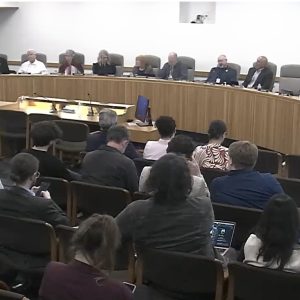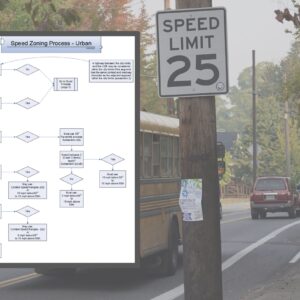
on a bill that would reduce speed
limits on residential streets.
HB 3150 passed out of committee yesterday, but not without some drama. The bill, which would give cities the authority to reduce speed limits on certain “neighborhood greenway” streets to 20 mph, survived the House Transportation and Economic Development Committee by a vote of 5 to 3 yesterday.
The eight member committee is split evenly between Republicans and Democrats and the three representatives that voted against the bill were Republicans (committee co-chair, Cliff Bentz (R-Ontario) voted yes). According to freshman Rep. Shawn Lindsay (R-Hillsboro), the reason for their no votes had to do with a procedural issue centered around the terminology used in the bill.
“A greenway could be confused as a road full of shrubs, green trees, or whatever.”
— Rep. Lindsay
Lindsay does not like the term “neighborhood greenway” and wants the bill to be amended to call them “neighborhood byways.” Lindsay says he discussed the change with the bill’s sponsor, Rep. Ben Cannon (D-Portland), and that Cannon agreed to the terminology change.
Committee Co-Chair Tobias Read (D-Beaverton) told Lindsay in the work session yesterday that he had seen the amendment with the “byways” change, but that he didn’t want to stall the bill.
“We do have the amendment, but we don’t have the fiscal and revenue statement [a document all bills must have]… While it seems unlikely to change those, we don’t have them and we’re interested in moving the bill forward.”
“Why don’t we just wait to get the amendments and then we can move that bill?” Lindsay asked Read. “I did speak with Rep. Cannon about this,” replied Read, “and he was deferential to the judgment of the committee… I would suggest if you’re not comfortable with that you are certainly welcome to vote no.”
Representatives Patrick Sheehan (R-Clackamas) and Jim Weidner (R-Yamhill) both agreed with Lindsay, saying they wanted to see the amendment. When it came time to vote, all three of them voted no.
I spoke with Rep. Lindsay this morning to learn more about his concerns. He says his no vote was based on procedural grounds.
“The only reason why I and the others voted against it was that Rep. Cannon, the sponsor of the bill, agreed to amend it… And for whatever reason the Co-Chairs didn’t want to amend it… Their refusal to amend it was the reason I voted no.”
When asked why he objected to the “greenways” name, Lindsay said, “It’s not descriptive of what it’s actually doing. A greenway could be confused as a road full of shrubs, green trees, or whatever.” [It should be noted that trees and vegetation are a key part of how PBOT approaches these streets. A PBOT staffer recently referred to neighborhood greenways as an attempt to “create trail-like conditions on neighborhood streets.”]
Lindsay also said that he’s “concerned about there being a greenwashing of everything” which “dilutes the true meaning behind it.” “The purpose for this bill, wasn’t energy conservation, it was for public safety. Let’s call it what it is.”
Lindsay said it’s a “good bill” and that it would have come out of committee 8-0 if it would have been amended. He wants Rep. Cannon to re-refer the bill the committee.
Rep. Cannon says he doesn’t care what the streets are called, he just wants the bill to move forward. “I gave the amended language [as per Lindsay’s request] to the committee chairs and said to them, ‘I don’t care, it’s a committee decision’… Whether it’s a byway or a greenway, it’s a trivial issue as far as I’m concerned.”
Cannon pointed out that the wording in the statute will in no way mandate what cities end up calling the streets.
“There are millions of examples where parlance is out of sync with the law. You wouldn’t want our speech and vocabulary to be defined by the ORS.”
Cannon says he has no plans to send the bill back to committee, in part because the name change wouldn’t change the substance of the bill at all.
“There’s not a single iota of policy difference in making that change. I’m not planning to send a bill back to committee that has [an amendment] with no bearing on the impact of the law. It would be purely symbolic… What they’re called doesn’t matter.”
From here, the bill will move to the House floor. We’ll keep you posted. See further coverage of this bill here







Thanks for reading.
BikePortland has served this community with independent community journalism since 2005. We rely on subscriptions from readers like you to survive. Your financial support is vital in keeping this valuable resource alive and well.
Please subscribe today to strengthen and expand our work.
Good to hear it is moving forward! Greenway/byway whatever…..
I like “greenway”, party because it does seem new and confusing… if the road if full of shrubs you shouldn’t be going over 20 mph anyway…
the term “byway” reminds me of fast moving vehicles… but I just looked it up and I must have picked up the wrong meaning somewhere…
byway: a secluded, private, or obscure road.
greenway: any scenic trail or route set aside for travel or recreational activities.
so I guess in an effort to further promote these streets as true transportation corridors we could use byway in order to ditch the recreational stigma…
but I like that they’ll focus on “green” elements… I love the trees and bioswales… and I think greenway just sounds more pleasant…
I’m torn…
Spiffy…you might have been thinking of the word ‘bypass’, which is sometimes used for roads that allow vehicles to keep their speed up by not having them go through the center of a town.
Lindsay’s suggested alternative, “neighborhood byways.”, for streets that would meet the criteria for reduction in speed limits according to this bill, is better, but I’m not sure it’s a great alternative.
It just doesn’t really seem that any street with 2000 or less car trips a day traveling under 35mph, and marked with a pedestrian and/or bike sign, necessarily would be a ‘neighborhood byway.
Can’t actually think of a better alternative though. Maybe ‘Neighborhood Through Routes’.
Just for one example of the definition of ‘byway’, here’s what WordWeb defines it as:
” 1. A side road little traveled (as in the countryside) “.
I wonder how much if any consideration people that put together this bill and also, the people that sponsored it, gave to how many neighborhoods with streets that meet the bills criteria for reduced speeds, will want to take advantage of what this bill stands to offer.
Why not just a “residential street” I mean, does it really matter as long as the speed limit is lower?
“Why not just a “residential street” …” daveness
That’s a good point. I just saw your comment, but further down the list of comments, I raised essentially the same point. Why did this bill’s writers decide to use that catchy new phrase ‘Neighborhood Greeways’, whose meaning is yet to be well defined, and whose application to the streets this bill would address may not be particularly relative? Doing so complicated the ability to more easily understand what this bill might be able to accomplish.
This is a perfect example of government just getting in the way “I agree with the bill, but just don’t like the one little terminology, so I’m going to vote against the whole bill”
Stupid technicalities like this are what keep government from really getting things done.
Silly, just plain silly.
Well said.
Agreed! I sometimes wonder about all that weird stuff, and why it’s done in the first place…
I wrote all three of the reps who voted no urging them to continue their support of the idea of the bill by advocating for it and voting yes when it comes to a full vote. It is totally understandable for them to vote no on principle as they knew it was going to be 5-3 and therefore not actually stop a bills whose main idea they support. Since Cannon doesn’t intend to refer it back to the committee this is likely going to be the language that gets voted on so now is the time for them to look past the nomenclature and cast their vote based on the actual impact of the bill.
Spot-on, Bjorn. I don’t think it was totally understandable for them to vote no, but I do think we should encourage them to support the bill as-is when it comes to the floor. Thanks for you efforts.
I hear you Bjorn. My hunch is that it will pass the House… but it’s a bit more of a nail-biter because of the 5-3 vote. Especially in an evenly divided House chamber, I hope that vote count doesn’t raise too much of a red flag for folks. Hopefully if colleagues ask Lindsay about it he’ll give the bill a thumbs up.
One other thing… I’ve got to say it seems like pretty poor political judgment to vote no on a basic public safety bill that will make neighborhoods safer simply because of semantics. Oh well.
suggest “slow ways” as opposed to speedways. “dude, way are you taking the slow way with your car?”
From maus’s story it appears that co-chair Tobias Read left Lindsay, Sheehan and Weidner hanging. Cannon’s agrees to the terminology change, but Read won’t promise that it’ll happen.
So promise that the terminology will be changed is all Read needs to do. Sounds like the ball is in Read’s court, and if he’s smart, he’ll get busy…as in ‘immediately’, and get “… the fiscal and revenue statement …” rushed through for the simple examination it’s likely to require.
Read’s, Cannon’s, and others light dismissal of the terminology is a big mistake. They should have got this right in the first place, and there’d have been no holdup. Using trendy, wonk-lite terms bearing little or no meaning to the situations to which they’ll be applied serves to confuse rather than support and enable understanding of laws in which the terms are used.
They have to balance the importance of suggested amendments with the need to get things done. As Cannon put it… the terminology is “trivial” to the real important policy of this bill. Also, just to be clear, while Cannon agreed to draft an amendment at Lindsay’s request, Cannon also gave the final decision as to whether to officially adopt it or not to the Committee Chairs. Both committee chairs took Cannon’s proposal and decided to hold a vote with the language as is.
I apologize if my story didn’t make that clear.
No…I don’t think the confusion much lies with what you’ve reported regarding this most recent development with the bill. It’s a bit confusing for a lot of people, I suppose, to follow the procedure required to get a bill prepared for a vote in the house.
Cannon and Reid don’t appear to particularly object to changing the terminology; they just aren’t enthusiastic about doing it because the procedure required to make the change is more involved than simply taking out the eraser, and replacing ‘neighborhood greenways’ with ‘neighborhood byways’.
Apparently when a change even as minor as this is made, the bill has to be re-routed through more people’s offices to be checked out, which could take…who knows how long…so they don’t want to do it. They’d probably be wise to get on this though.
Before submitting it to committee vote, they should have put more thought and work into their definition of what ‘Neighborhood Greenways’ is supposed to mean and how it applies to the streets this bill would include.
It might be worth bikeportland reader’s time to consider a different example of an Oregon law whose inaccurate….maybe call it inexact wording has created big problems for at least one Portland road user. That would be the law referring to the question of bike lane presence in an intersection, upon which Judge Pro Temp made a very controversial decision last year.
A rose by any other name is still a rose.
I’m glad it passed.
@wsbob, neither byway or greenway are actually defined in ORS, in fact defining greenway is part of the intent of the bill as requested by the City of Portland. Considering the way the neighborhood greenway has been already implemented in Portland perhaps Read doesn’t agree with the need to change the terminology that is already in use. “Byway” is not magically right because 3 of 8 representatives on the committee prefer it. Portland requested the definition be added as “Neighborhood Greenway” and while I am sure that if they had to pick between another new name or not getting anything they would take the former but why change from the name that is already in use?
“…but why change from the name that is already in use?” Bjorn
Because…the meaning of the name…term…phrase…does not aptly describe the situations to where it stands to be applied, and as a result, unnecessarily confuses the issue. That term ‘neighborhood greenways’, is some new phrase somebody…I guess with the city of Portland…coined to connote an idea they have to highlight the city’s addition of bioswales and whatever… .
The phrase does not well relate to the situation this bill addresses, which is a long standing one of common, ordinary neighborhood streets being turned into a kind of hell by cut-through motorists.
This bills writers might simply and more effectively have used the phrase ‘Residential Neighborhood Streets’. Everybody knows what that phrase means, and they also are well familiar with the common problem of people using their neighborhood streets for high speed cut-throughs.
No we know what Lindsey’s priorities are… he is going to defend us all from greenwashing.
Greenwashing doesn’t kill nearly as many people in a year as cars speeding though residential neighborhoods do. Now, it is early in the session… this is the stand you want to take?
I want to see the legislature WORK, not quibble.
Still a valid point.
Lindsay actually has a good point. Let’s define “greenway” so that, in the future, no builds a freeway or something akin to the CRC and finds a clever way to brand it “greenway”. (Ex. – we will incorporate wind turbines or solar panels to power the roadway lights and plant 10,000 Doug Fir seedlings within three miles of each side of this “greenway” across the Columbia.)
We should be protected from greenwashing. Case in point, hybrid cars. If people think that they are “green”, buy lots of them, drive more miles, and then junk them and their poisonous batteries – was that truly “green” or just marketing tripe?
Good news! The new bill defines a Greenway as:
“(c) As used in this subsection, ‘neighborhood greenway’ means a
highway in a residence district that:
“(A) As determined by the road authority having jurisdiction over
the highway, has an average volume of fewer than 2,000 motor vehicles
per day, more than 85 percent of which are traveling less than 30 miles
per hour; and
“(B) Has a traffic control device that indicates the presence of pedestrians
or bicyclists.”.
So… I’m not sure if Lindsay’s point is that there is no definition. He appears to this particular definition.
Taking issue with greenwashing is fine, but how do you do that in a productive way? I mean, we have Nissan “Leaf” which is basically coal powered.
I’d say educating the public, or introducing thoughtful legislation that directly addresses this larger issue would do more to help out than voting “no” on a bill you claim to agree with because you object to the implications of a term.
Plus, I’m not convinced that this is a case of Greenwashing. The Greenways, as conceived, are also bike boulevards, right? That has nothing to do with green?
Perhaps the Republicans can see this for the good safety bill that it is but know that their constituents are going to have a knee jerk reaction to anything that smells of the church of green.
Just give cities and towns control of the speed limits on their own streets whatever their name!
This is a great win for neighborhoods and the people who live and move through them.
“The only reason why I and the others voted against it was that Rep. Cannon, the sponsor of the bill, agreed to amend it…”
I call BS. Jim Weidner would vote against it anyway; this was just a clever cover for him.
What good reasons do you have that would explain why you feel Jim Weidner (R-Yamhill) would have voted against the bill even if the co-chairs had agreed to amend the bill?
@andrew, I have not heard from representative Weidner, but I have received an email from Representative Sheehan and I do think that he was planning to vote for the bill and that he honestly believes it would have come out of committee 8-0 if the change had been made.
The bill sounds toothless. Any such bill has to a.) raise speeding fines substantially, enough to b.)fund increased police staffing for the necessary increased enforcement. There has to be a willingness to make drivers suffer immediate consequences for their speeding to make this work–drivers need to feel some amount of fear to heed a speed limit sign!